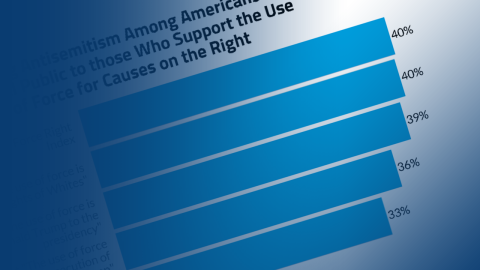
Findings
Americans Evincing the Most Antisemitic Beliefs Also Support the Most Serious Violent Threats to Democracy
The data shows that support for political violence for causes on the right is significantly higher among individuals high in antisemitism than in the general public.
Among Americans high in antisemitism1 support for the use of violence to restore Donald Trump to the presidency is three times higher than in the general population, 15% vs. 5%. Similarly, while 12% of Americans score high on antisemitism, these attitudes are about three times more common among violent supporters of Trump (38%). Even when controlling for the influence of such important variables as gender, race, age group, education level, region, and socioeconomic status, the relationship between antisemitism and support for the use of violence to return the former president to office is substantially higher than in the general population. This holds, too, for numerous political goals associated with the right.
Figure 1 below shows the survey results for each of four statements involving support for political violence related to causes on the right, as well as our “Force Right” index showing average levels of agreement with all four of these statements. The four right-valenced political violence questions measure support for (1) the use of force to restore Donald Trump to the presidency, (2) the use of force for preventing legal prosecution of Trump, (3) the use of force for preventing the teaching of critical race theory in schools, and (4) the use of force for preserving the rights of white Americans.
Between 5% and 9% of the U.S. population (approximately 13 to 23 million adults) agree with each of these beliefs, with an additional14% to 21% (36 to 55 million) expressing ambivalence about whether they do or not.2 Previous CPOST surveys have shown that asking respondents about “the use of force” and “the use of force even if some people are injured or killed” yields almost identical results, depending on the specific political objective in the question.
Figure 2 below shows the relationship between these questions and high antisemitism.
Figure 2
Regardless of which statement we use to measure support for political violence, individuals who score high on antisemitism are more likely to support political violence in pursuit of goals associated with the political right. Thus, individuals who score high on antisemitism are still 2.8 times more likely to want to use force to prevent the teaching of CRT, 3.2 times more likely to want to use force to prevent Trump’s prosecution, 3 times more likely to want to use force to restore Trump to the White House, and 3 times more likely to support the use of force to preserve white rights. Combined, we see that they are more than 3.6 times more likely to score high on the “Force Right” combined index of all four of these items.
We also examine the converse: among supporters of political violence on the right, how common are individuals high in antisemitism? We find similar results: individuals who support right-valenced political violence are far more likely to also exhibit high levels of antisemitism, as Figure 3 below shows.
Figure 3
Irrespective of which question we use to measure support for political violence, we find that people who support it tend to be more highly antisemitic. In fact, depending on the question, between 33% and 40% of respondents who expressed support for political violence on the right also exhibit high levels of antisemitism. This makes antisemitism between 2.8 to 3.3 times more common among supporters of political violence on the right.
These results indicate a substantial overlap in the United States between antisemitism and support for violence on the right.
Antisemitism is Highly Correlated with Belief in Dangerous Political Conspiracy Theories
We also examined the relationship between antisemitism and a number of antidemocratic conspiracy beliefs which CPOST has consistently found to be associated with support for right-wing political violence. These include (1) that the 2020 election was stolen and Biden is an illegitimate president, (2) the “Great Replacement” idea that the Democratic Party, or Globalists (often a code word for Jews), are deliberately replacing the current electorate with more obedient voters from the third world, a conspiracy based on a core white supremacist belief; and (3) the QAnon idea, which often echoes age-old antisemitic blood libels, that a secret group of Satanic-worshipping pedophiles is running the U.S. government.
We also examined the role of white status anxiety, particularly in the context of changing American demographics. We asked two questions: 1) that white Christians will become an oppressed minority in America, and 2) that African American or Hispanic people in the U.S. will eventually have more rights than white people. Answers to these two questions were also averaged to provide a score on the Status Loss Concern index.
This study examines the proportion of Americans who agree with each of these conspiracies considered separately, as well as in combination and then in association with high antisemitism.
Figures 4 and 5 below show that between 10% and 25% of Americans agree with these dangerous political conspiracy theories.
Figure 4
Figure 5
Figures 6 and 7 below show the extent to which these beliefs are possessed by individuals with high antisemitism, measured by the anti-Jewish Trope Index. Compared to the general population, the strongest antisemitic Americans are between 1.6 and 2.8 times more likely to support these dangerous political conspiracy beliefs. This is consistent with prior ADL findings.
Figure 6
Figure 7
Figures 8 and 9 below reverse these associations to look at the prevalence of high antisemitism among those with conspiratorial beliefs. We see again that antisemitism is more common among individuals who hold conspiratorial beliefs than it is in the general population. The range is from 1.5 to 2.75 times.
Figure 8
Figure 9
Similar to our findings regarding support for violent political threats to democracy, there is a strong association between the most antisemitic Americans and those Americans supporting dangerous political conspiracy theories.
Antisemitism correlates with support for political violence on the Left
To assess the relationship between antisemitism and support for violence on the left, we examined the proportion of Americans who agree with the use of force for three political causes associated with the political left: preventing police brutality against Black Americans and other vulnerable minorities, protecting voting rights for Black Americans and other marginalized groups, and restoring the federally protected right to abortion. We first consider support for these causes separately, next in combination, and then in association with high antisemitism scores.
Overall, Americans with strong antisemitic attitudes are about twice as likely as those in the general population to support the use of force to restore the federal right to abortion, protect minority voting rights, and prevent police brutality against minorities.
Figure 10 below shows that between 9% and 14% of Americans support violence in support of political causes associated with the left.
Figure 10
Figure 11 below shows the extent to which these beliefs are possessed by individuals with high antisemitism scores. Compared to the general population, the most antisemitic Americans are between 1.5 and 2.0 times more likely to support violence in support of these left-valenced causes.
Figure 11
Figure 12 below reverses the analysis to look at the prevalence of high antisemitism among Americans who express support for left-oriented political violence. Once again, we find a pattern where higher levels of antisemitism are associated with support for political violence, this time on the left. At the low end, 17% of Americans who express support for using force to protect minority voting rights and 20% of Americans expressing support for the use of force to restore abortion rights are highly antisemitic, compared to the 12% of the general population identified as highly antisemitic. At the high end, a striking 24% of Americans expressing support for the use of force to prevent police brutality are highly antisemitic, compared to 12% of the general population.
In general, Americans who support the use of force for left-oriented causes are between 1.4 to 2.0 times more likely to be highly antisemitic than the general population.
Figure 12
Our analysis reveals that the relationship between antisemitism and political violence is not limited to only one part of the political spectrum. Support for political violence is associated with high levels of antisemitism, regardless of the political orientation of the specific causes. Further study is needed to better understand this relationship and how it manifests across political positions and ideologies. While the correlation of antisemitism with violent support for political causes associated with the right is greater, the association of antisemitism with support for the use of force in support of left-oriented causes is still significant and substantial.
Antisemitism and other antidemocratic political positions
Among Americans high in antisemitism, support for ignoring the U.S. Constitution is nearly three times greater than in the general population, 31% vs. 13%. Similarly, while 12% of Americans scored high in antisemitism, these attitudes are more than twice as common among those willing to abandon the U.S. Constitution in the general population (28%).
Among Americans high in antisemitism in this survey, the level of support for a “national divorce” between Red/Republican and Blue/Democratic states is over twice that of the general population, 33% vs. 16%. Similarly, while 12% of Americans have strong antisemitic attitudes overall, these are twice as common among those favoring a national divorce (24%).
Americans high in antisemitism are also nearly twice as likely as Americans in general to support declaring the United States a Christian nation, to believe that white Christians are oppressed, and expect whites to have less rights than minorities in the future.
Figure 13 below shows that between 13% and 18% of Americans agree with each of these antidemocratic positions.
Figure 13
However, as Figure 14 below shows, support for these right wing antidemocratic positions is significantly higher among the most antisemitic Americans compared to the general population. These beliefs are only present in the general population at relatively low rates (18, 16, and 13% respectively), but nearly a third of Americans with high levels of antisemitism hold them (36, 33, and 31% respectively), making them between 2 and 2.4 times more common among individuals with high levels of antisemitism.
Figure 14
And, as Figure 15 below shows, the most antisemitic Americans are also more likely to support political attitudes that are deeply undermining of democracy. While our spring 2023 survey shows high antisemitism is only present in the general population at a rate of 12%, it is far higher among Americans who favor declaring the U.S. a Christian nation, effecting a national divorce, and setting aside the U.S. Constitution when it opposes their position, by a range of 1.5 to 2.4 times.
Figure 15
Hence, similar to the findings about American support for antidemocratic political violence, there is also a strong association between the most antisemitic Americans and those supporting a variety of fundamental political positions that are antithetical to democracy.
[1] Individual antisemitism is measured using the anti-Jewish Trope Index (AJTI is explained in the appendix)
[2] The survey was fielded after the Manhattan District Attorney brought state criminal charges against former President Trump and before the Department of Justice brought federal criminal charges against him in connection with Trump’s handling of classified documents. However, the latter, as well as cases in Georgia and by the Department of Justice for attempting to overturn the 2020 presidential election, were all moving forward and widely reported on at the time. CPOST quarterly “Dangers to Democracy” surveys published in The Guardian will track changes in American support for political violence through the 2024 election season and initial results show increases in such support. However, the purpose of this report is to understand the relationship between support for political violence and antisemitism, which was the focus of the spring 2023 survey discussed here, though that relationship is likely to persist even as magnitudes change, since the results showing a correlation are robust to so many questions and specifications.


